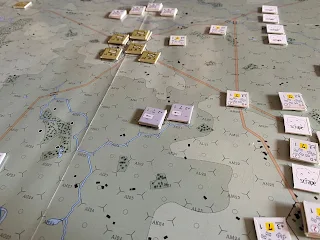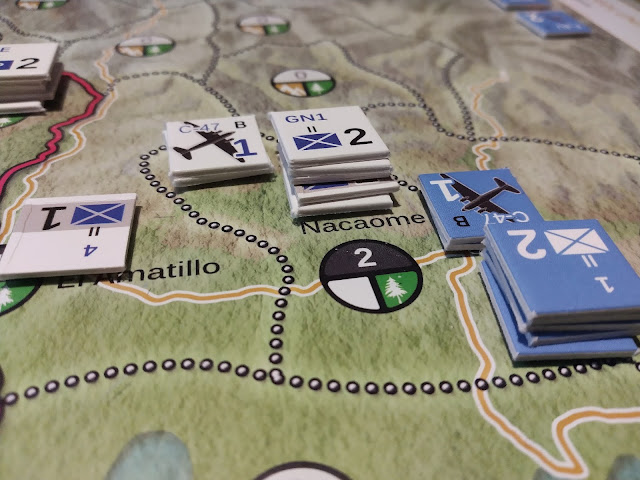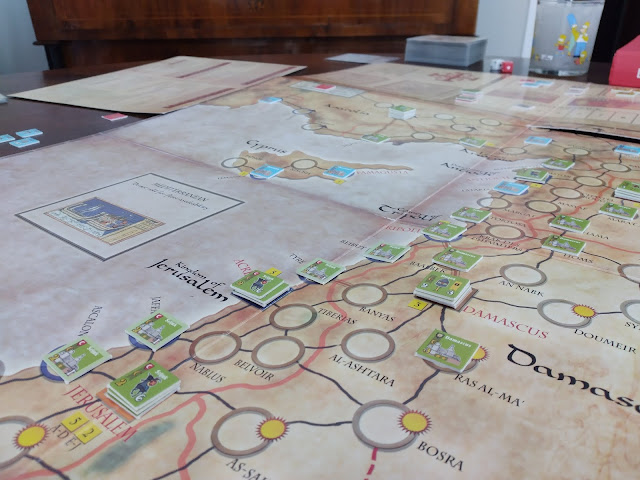The Battles for Ypres. The Siege of Geluvelt. Part 1
Central Powers: Alex Isabelle
Triple Entente: Laura Zambonini Beltrami
October 29th 1914, first day
It's night. The fog is so dense that the various companies of the 54th division of German reserves, that have been assigned the thankless task of conquering Geluvelt, a small Flemish village not many kilometers east from the city of Ypres, find themselves advancing for a few hours in conditions of substantial blindness. Aware that straight ahead of them there are a few but experienced British expeditionary troops - a mixed force, made up of a few companies from the Coldstream Guards, the Black Watch and the Grenadier Guards - they advance west side by side, following the road that joins the city of Menen, formerly under German control, to Ypres. Geluvelt is located exactly halfway along this street. Its small castle towers over a strategically useful intersection. Further south is a much smaller village, Zandvoorde; the directives are to conquer this too within three days. This to compensate for the failures obtained in the south by the German offensive, which - accompanied by similar failures also by the Allies - triggered a progressive expansion of the front towards the north, which brought us here, to the parts of Ypres.
.jpeg) |
| The two sides face each other. |
The German reserves, well ordered side by side over an area one and a half kilometers wide, progressively approach the defensive lines dug by the British, stopping a few hundred meters from them, waiting for the order to advance, which should arrive at dawn. The front is to all intents and purposes separated into two parts: one, the largest, is located at the level of the Menen road; the other, further north, is about half the width of the first and extends from the Sherriabeek stream towards Becelaere, a small town of lesser strategic interest. Two "wild card" companies stand halfway between these two main camps.
For their part, the British do not know exactly the quantity of troops that are about to attack them: the German reserves overwhelm them numerically, but since they are oblivious to this many of their forces are stationed further west, far from the immediate front: the first battalion of the Gloucestershire Regiment, accompanied by three divisional artillery batteries, is encamped in Hooge, halfway between Geluvelt and Ypres, while some squadrons of cavalry are positioned even further in the rear, in Zillbeke, a village on the outskirts of Ypres, located near a crossroad which is useful to quickly reach both Geluvelt and Zandvoorde.
Suddenly comes the signal that the German troops were waiting for: a preliminary bombardment that hits all the roads and inhabited centers west of the German line, up to Zillbeke. It is an early-war bombardment: we are still in 1914 and the blows of the German artillery damage a large area of territory in a not very targeted manner, without causing much damage to the units, which are in any case catapulted disorderly out of the cot. Zillbeke does not sink into total chaos just because most of the troops are actually encamped outside the town, a hundred meters to the west; in Hooge, on the other hand, the units are dispersed, as many men leave their tents to run away in the surrounding woods. This does not significantly damage the British troops, but disorganizes them, blocking the arrival of reinforcements from Hooge to Geluvelt, the obvious goal of the German advance, which at this point begins.
.jpeg) |
| The troops stationed in Hooge, disorganized by the bombardment. |
While the minor front, the one further north, remains stationary as it waits for developments, the main German line, to the south, begins a rapid advance towards the British positions. The fog is so dense that it obscures the sky: despite the sun is rising, the German troops still find themselves groping in the darkness. On the one hand, this offers them cover, significantly reducing the range and accuracy of the British shots, but at the same time causes great embarrassments: more than one German company is forced to slow down to recover dozens of soldiers who, having lost the orientation, end up dispersing: some falling into a ditch, some into a hedge, some charging in the wrong direction. Encouraged by the English bullets, which at this point begin to pour decisively on them, several companies rush into a grove about a hundred square meters wide, dispersing themselves, while some groups of reservists more skilled than the others manage to move easily on the south end of the front, starting a quick encirclement of the English troops, unable to stem their rapid advance.
This first fight lasts a few hours. The British units are progressively overwhelmed, starting with those that are stationed along the Menen road, and ending with those defending the outskirts of Kruiseke, a small town located right next to the English line. The units dissolve one after the other, under the close engagements of German bayonets: many are captured or killed, while a fair amount of men flee in the night in the direction of Geluvelt.
The British obtain the result of dispersing, by means of their shots, almost all the German companies, which therefore engage their positions in a disorganized manner, still obtaining significant successes, albeit not too quickly. This slows down the arrival of some German machine guns from the rear lines and gives the British units in Hooge and Zillbeke a minimum of time to regroup, which is not the case anyway.
.jpeg) |
| After a painstaking reorganization, the english cavalry rides towards Hooge, while a towed artillery proceeds on a minor road through the woods. |
The cavalry, as mentioned, was in fact encamped just outside Zillbeke, and the dense fog extends up to here. The terrible environmental conditions make it difficult for the soldiers to tame their runaway beasts even for those hundred meters that separate them from Zillbeke, where they will find a real path. Consequently, some horsemen get lost in the night, some horses escape their owner and run away at a gallop in the darkness, and some officer gets a hoof on the head. The race towards Zillebe results in a chaotic melee that slows the reorganization of the few troops stationed within the city limits and prevents the cavalry from quickly reaching Hooge, where the officers of the Gloucestershire 1st Battalion are still trying to put their troops in line and to reorganize their diviional artillery, without any success. It will take an hour for a single company of cavalry to arrive in Hooge and contribute to the reorganization of the regiment; during the next hour the cavalry units themselves in Zillbecke are reorganized and finally manage to leave the village.
 |
| Every single unit gives what it can in the clash between english and german lines. |
While all of this is happening, the lines north of the Sherriabeek stream remain completely still. On the one hand, the germans are waiting orders before advancing; on the other hand the british are waiting for germans to show up. The wait ends when a single German company, one of the few still in formation, manages to cross the English lines to the south, along the Menen road to the intersection with the road that joins Kruiseke and Becelaere, and from there go up for half a kilometer to the north, placing itself behind the English line. From here, notes are made about the enemy positions, and a recruit is sent back to the German camps further east, where the Howitzer batteries are located. The order to fire will take no less than six hours to make its way over rough terrain, beyond enemy and friendly lines, beyond canals and hedges, until it reaches the person in charge of coordinating the aiming of the guns and, from here, result in an actual artillery bombardment. The awareness of having been surrounded and of being potential cannon fodder shakes the English troops, who begin an orderly but diligent retreat towards Geluvelt, which is now easier to do considering that the fog finally rose, letting the light pass and making it possible to orient oneself between unknown fields and ditches. The company from which the spotter started, now joined by two other companies from the southern theater, hides in a bush in front of Geluvelt, opening fire on the retreating English troops, managing to disorganize one and eliminate another. One of the retreating companies will actually be able to reach Geluvelt, while the fourth and final will remain stuck in its position. Here it will eventually be hit by artillery shells. Many soldiers will die, and the unit will actually be destroyed. This will open the way to the still unscathed and well-organized German troops.
.jpeg) |
| While the english troops are overwhelmed a triptych of companies heads north and calls for bombardment on the enemy lines. |
During the following hours some English cavalry force, after having helped to reorganize the troops in Hooge, manages to reach Geluvelt. While this happens, the English line south of the road to Menen crumbles: the road is completely cleared, allowing the passage of the German machine guns, pulled by mules. At the same time, the German reserves that survived the massacre reorganize themselves, while those of the northern line, being still in formation and therefore more agile, quickly travel the path that leads from Becelaere to Geluvelt, only to then keep out of the reach of the English cavalry, unexpectedly bypassing the Belgian town and reaching the stretch of road that connects Geluvelt to Hooge, from which an English horse-drawn artillery is arriving. The latter is immediately captured, and the German reservists immediately begin to dig holes in which to shelter, effectively building a defensive line that splits the road in two, isolating Geluvelt. At the same time some German troops to the south accelerate their pace, fording the ditches and canals that separate them from Zandvoorde.
It's been a long day of fighting, but it's not over yet. As darkness falls, both the Germans and the British want to continue the battle. In truth, during these hours nothing more than a further reinforcement of the German posts between Geluvelt and Hooge happens, while the English cavalry tries, with very moderate successes, to circumvent the latter, passing the Dombarton lakes, a small nameless stream and camping in the forest that grows on the descending side of the hill that divides Zandvoorde from the German camp on the way to Hooge. Meanwhile, the Germans lead mules with machine guns through the darkness; after six hours of walking - slow, disorganized, pathetic - the cavalry stationed in Geluvelt even manages to fire on some of these mules, killing them and breaking the machine gun they carried with them. The other two machine guns, on the other hand, manage to reach the road that goes from Geluvelt to Zandvoorde, thus also breaking this supply route between the two strategic points.
 |
| Mule-backed German machine guns bypass Geluvelt. Further north, from the side opposite of the city, the German reservists run to block the Hooge-Geluvelt road. |
Finally the troops set up camp. During the night, an enormous number of wounded and frightened troops, surviving the melee with the Germans, will manage to reach Geluvelt, where they get reorganized into new companies of survivors. The British, by making their colonial servants work in the silence of the night, will even manage to bring one of the divisional artillery pieces previously found in Hooge to Geluvelt, passing through the German lines, while the latter will work hard to move one of the machine guns arrived on the back of a mule to a better position.
Geluvelt is surrounded, but still well defended by a handful of forces stationed within the city walls. In addition, reinforcements are about to arrive: as many as twenty-four companies, made up of survivors of the British 2nd and 3rd Brigades, have been prepared. The next day they will enter battle against an even more numerous German enemy: hundreds of soldiers are about to arrive from the east, more experienced than the reservists who fought this first day of clashes, afferent to the 30th and 39th German divisions. The battle for Geluvelt will turn into a siege. The massacre is still far from its end.
Stay tuned...
Do you want to read other stories? Click here for the full list.




Comments
Post a Comment